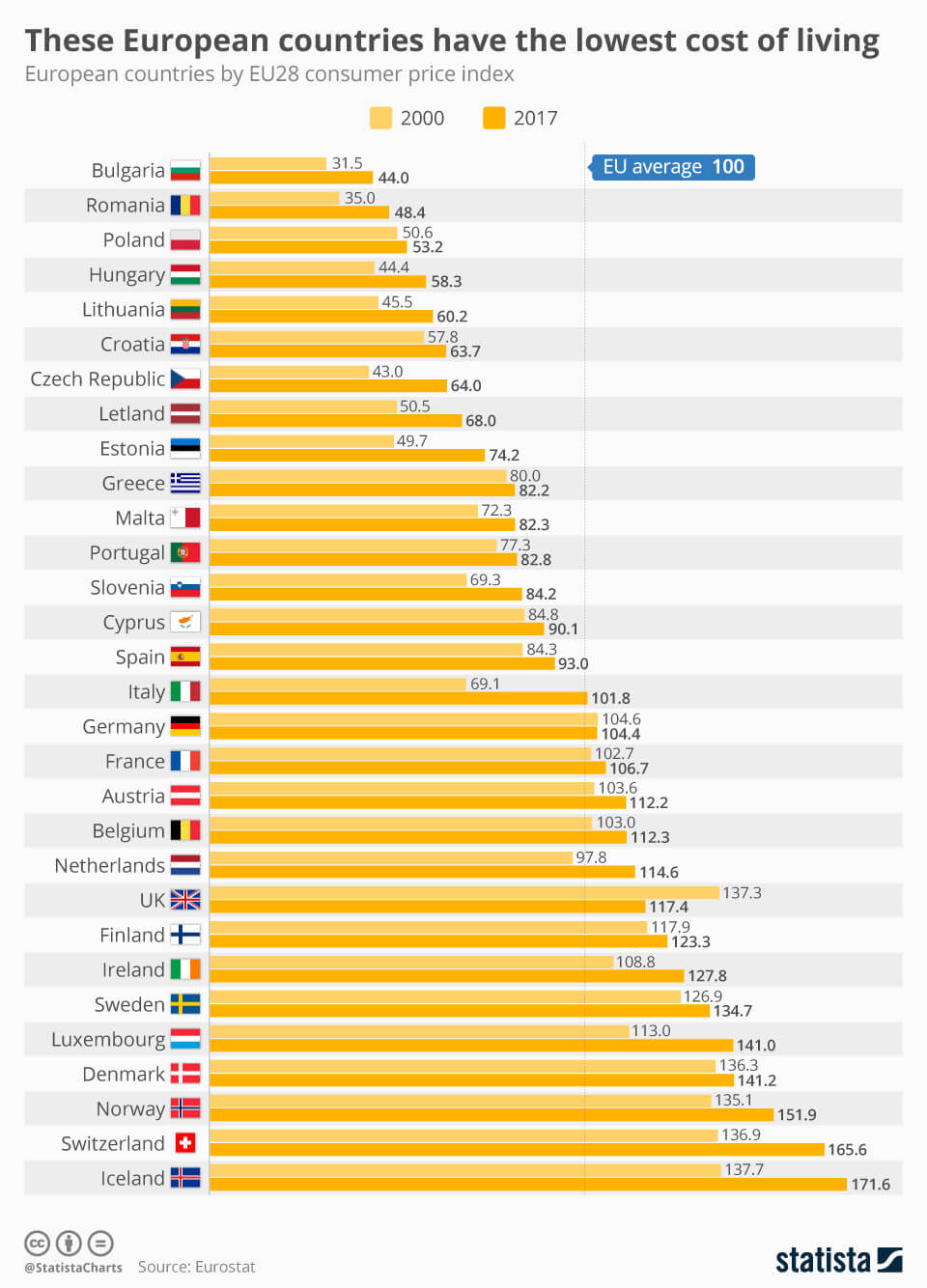

Studying abroad is a life-changing experience that can open new doors for your education, career, and personal development. However, with so many countries to choose from, it can take time to figure out where to start. In this Abroadin article, we walk you through choosing where to study abroad, from considering your interests and goals to researching different countries and programs available. Let us get to them:
In this guide:
- Consider Your Interests and Goals
- Research Different Countries
- Research Available Programs
- Talk to Your Advisor
- Trust Your Gut
- Conclusion

1. Consider Your Interests and Goals
The first step to choose where to study abroad is considering your interests and goals. Ask yourself these questions:
- What are you passionate about?
- What do you want to learn?
- What do you want to do after graduation?
Suppose you are still determining what interests you; take some time to explore your options. These are some ways to do so:
- You can talk to academic advisors about your interests and goals. They can help you assess your academic needs and ensure your chosen program fits well. If you are looking for the best advisors, consider Abroadin services.
- Some blogs and websites can help you learn about different countries and cultures. You can also read books and watch movies about different countries.
- You can contact the programs directly once you have narrowed down your choices. It is a great way to ask questions and get more information about the program.
- It is essential to start planning early. It gives you enough time to research programs, apply for scholarships, and get your visa.
Once you have a better understanding of your interests, you can start to narrow down your choices.
For example, suppose you are interested in learning about a different culture. Consider studying abroad in a country with a different language or culture than your own.
If you are interested in pursuing a specific career, consider studying abroad in a country that has a strong economy in that field.
It is also essential to think about your goals for studying abroad. To have a better understanding, answer these questions:
- Are you looking to improve your language skills?
- Do you want to gain work experience?
- Do you want to learn about a different culture?
Once you know what you want to achieve, you can look for programs to help you reach your goals. Here are some tips for considering your interests and goals:
- Be honest about what you want to get from your study abroad experience.
- Feel free to explore different options.
- Talk to people who have studied abroad about how to choose where to study abroad.
- Do your research and find a program that fits you well.

2. Research Different Countries
Once you know your interest, it is time to start researching different countries. You should be prepared for a different lifestyle.
There are many factors to consider when choosing a country to study abroad, such as the cost of living, the climate, the culture, and the availability of programs.
Here are some of the factors you should consider when researching different countries to choose where to study abroad:
Cost of Living
How much will living in your destination country cost? It includes things like housing, food, transportation, and entertainment.
Climate
What kind of climate do you prefer? If you are still deciding to choose where to study abroad, consider your home country’s climate and what kind of change you seek.
Culture
What kind of culture are you interested in experiencing? Do you want to learn about a different vision, cuisine, or way of life?
The United Kingdom, The United States, Canada, Australia, and New Zealand are among the most popular countries for study-abroad students.

3. Research Available Programs
Once you have a general idea of the countries you are interested in, it is time to start researching specific programs.
What kind of programs are available in the country you are interested in? Are there programs that align with your academic interests?
Different study abroad programs are available, so finding one that fits you is essential. Here are some of the most popular types of study abroad programs:
- Academic programs allow you to take classes at a university or college in another country. It is a great option to earn credits that will transfer back to your home university.
- Internships: Internships allow you to gain work experience in your field of study in another country. It is a great way to network with professionals and learn about different cultures.
- Volunteer programs: Volunteer programs allow you to give back to the community in another country. It is a great way to learn about different cultures and positively impact the world.
- Language programs: Language programs allow you to immerse yourself in a new language and culture. It is a great way to improve your language skills and learn about another way of life.
When you are researching programs, it is essential to consider the following factors:
- Your academic interests: Ensure the program offers courses relevant to your major or interests.
- The length of the program: How long do you want to study abroad? Some programs last for a semester, a year, or even longer.
- The cost of the program: How much will it cost to participate? Be sure to factor in tuition, housing, food, and travel costs.
- The location of the program: Where do you want to study abroad? There are programs all over the world, so you will have plenty of options to choose from.
Once you have considered these factors, you can start narrowing down your options, find the perfect program, and choose where to study abroad.
If you need to find a study abroad consultant, here is an article for you:
4. Talk to Your Advisor
Your academic advisor can be a great resource when you are trying to choose where to study abroad.
They can help you assess your academic needs and ensure your chosen program fits well.
Here are some of the things you can talk to your advisor about:
- Your academic interests: What are you interested in studying abroad? What are your academic goals?
- Your language skills: Do you need to improve your language skills before you study abroad? If so, your advisor can help you find a program that offers language classes.
- Your financial situation: How much money do you have saved up for study abroad? What kind of financial aid is available?
- Your circumstances: Do you have any health concerns or other factors that you need to consider when choosing a study abroad program?
Your advisor can also help you learn more about specific programs and advise you on the application process.
They can also help you write your statement and letters of recommendation. If you are looking for the best advisors, consider Abroadin services.
In addition to talking to your advisor, you can also talk to other students who have studied abroad. They can share their experiences and give you advice on what to expect.
Here are some tips for talking to your advisor:
- Be prepared: Before you meet with your advisor, take some time to think about your academic interests, your language skills, your financial situation, and your circumstances. It helps you make the most of your meeting.
- Be specific: When you talk to your advisor, be specific about what you’re looking for in a study abroad program. It helps your advisor narrow your options and give you more targeted advice.
- Be open-minded: Your advisor may suggest programs you have yet to consider. Be open to their suggestions and be willing to explore new options.
Talking to your advisor is a great way to start your study abroad journey. Abroadin services can help you take a firm step in this path.

5. Trust Your Gut
The best way to choose where to study abroad is to trust your gut. If you have a feeling about a particular country, go with it!
Studying abroad is a once-in-a-lifetime opportunity, so choose a place you are excited about.
Here are some additional factors to consider when choosing where to study abroad:
- The length of the program: Do you want to study abroad for a semester, a year, or even longer?
- The language: If you are not fluent in the language of the country you are interested in, you must factor in the time and cost of language classes.
- The visa requirements: Ensure you understand the visa requirements for the country you are interested in. It includes things like the application process, the cost of the visa, and the length of stay.
- The safety of the country: It is essential to research the safety of the country you are interested in. It includes the country’s crime rate, political stability, and natural disasters.
Once you have considered all these factors, you will be well on your way to choosing the perfect place to study abroad.
After choosing where to study, maybe you should start looking for scholarships! here are 14 fully-funded scholarships for you:
Conclusion
Studying abroad is a life-changing experience that can open new doors for you. By researching, trusting your gut, and enjoying the journey, you can choose where to study abroad and have an unforgettable experience.
If you want opportunities to study abroad, subscribe to Abroadin’s newsletter for the latest news and updates about visas and admissions.
Sources:
https://www.statista.com/chart/15339/consumer-price-index-in-europe/
https://us.solutions.kompass.com/blog/advertising-in-different-cultures-kompass-can-help/


How useful was this post?
Click on a star to rate it!
Average rating 0 / 5. Vote count: 0
No votes so far! Be the first to rate this post.








No comment yet, add your voice below!